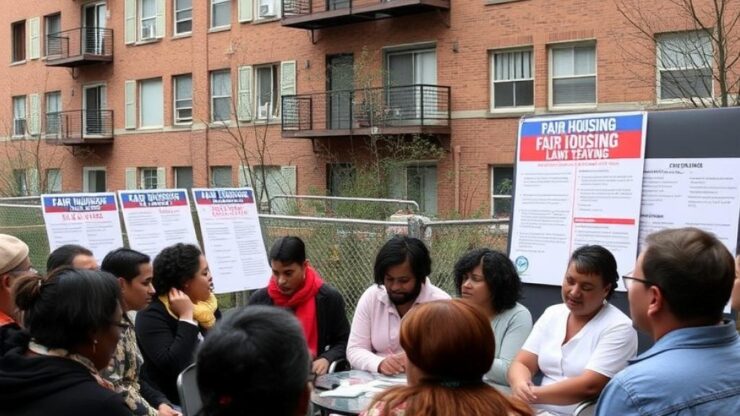Introduction to Fair Housing Laws

Understanding the Foundation of Fair Housing
Fair Housing Laws are critical in establishing a framework that protects tenants from discrimination and ensures equal opportunities in housing. These laws were enacted to combat the historical injustices faced by marginalized communities and to promote diversity and inclusivity within neighborhoods. Understanding these laws is essential for both tenants and landlords to foster a fair and equitable housing market.
Key Principles of Fair Housing
The cornerstone of Fair Housing Laws is the prohibition against discrimination based on specific protected characteristics. These principles serve as guidelines to ensure that everyone has the right to access housing without facing bias. Below is a comparative overview of the protected characteristics under federal law:
| Protected Characteristic | Description |
|---|---|
| Race | Protection against discrimination based on race or color. |
| Religion | Protection against discrimination based on religious beliefs. |
| Sex | Protection against discrimination based on gender, including sexual orientation and gender identity. |
| National Origin | Protection against discrimination based on where a person comes from. |
| Familial Status | Protection for families with children under 18. |
| Disability | Protection against discrimination based on physical or mental disabilities. |
Enforcement and Resources for Tenants
To ensure compliance with Fair Housing Laws, various governmental and non-governmental organizations have been established. Tenants who believe their rights have been violated can seek assistance from these entities. Resources such as local housing authorities and advocacy groups provide valuable information and support for those navigating the complexities of housing discrimination. It is vital for tenants to be aware of their rights and the avenues available for reporting violations.
Protected Classes Under Fair Housing Regulations

The Fair Housing Act was a monumental step towards ensuring equitable access to housing for all individuals, regardless of their background. Central to this legislation is the recognition of specific groups that have historically faced discrimination. These protected classes are essential in fostering an inclusive society where everyone can seek housing free from bias. Understanding these classes is crucial for both tenants and landlords, as it lays the groundwork for fair housing practices.
Recognizing the Protected Classes
The Fair Housing Act identifies several protected classes that must be considered in housing transactions. These classes are not only pivotal for preventing discrimination but also serve as a guideline for landlords and property managers. Below is a detailed overview of these protected classes:
- Race: Individuals cannot be discriminated against based on their race or color.
- Religion: Discrimination based on an individual’s religious beliefs is prohibited.
- Sex: This includes protection against discrimination based on gender, sexual orientation, and gender identity.
- National Origin: Individuals must not face discrimination based on their country of origin or ethnicity.
- Familial Status: Families with children under the age of 18 are protected from discriminatory practices.
- Disability: Individuals with physical or mental disabilities are safeguarded against discrimination.
Impact of Protected Classes on Housing Opportunities
Understanding the significance of these protected classes extends beyond compliance; it promotes a culture of respect and equality within communities. For landlords and property managers, acknowledging these classifications is essential for creating a welcoming environment. Discrimination can manifest in various forms, from refusal to rent to unfair terms and conditions. By recognizing and respecting the rights of these protected classes, stakeholders contribute to a more equitable housing landscape.
Tenant Rights in Lease Agreements
Lease agreements are foundational documents that outline the relationship between landlords and tenants. They serve not only as contracts but also as instruments that detail the rights and responsibilities of each party. Understanding tenant rights within lease agreements is crucial for ensuring fair treatment and avoiding disputes. Recognizing these rights can empower tenants to advocate for themselves and navigate their housing situations more effectively.
Essential Rights Embedded in Lease Agreements
Every lease agreement should encapsulate certain core tenant rights, which are designed to protect individuals from unfair practices. These rights are not merely legal formalities but serve to create a balanced and respectful living environment. Here are some essential rights that tenants should be aware of:
- Right to a Habitable Environment: Tenants are entitled to live in a property that meets basic health and safety standards. This includes functioning plumbing, heating, and electrical systems.
- Right to Privacy: Landlords must provide reasonable notice before entering a tenant’s unit, except in emergencies.
- Right to Non-Discrimination: Lease agreements must comply with Fair Housing Laws, ensuring that tenants are not discriminated against based on protected characteristics.
- Right to Security Deposit Protection: Tenants should be informed about the handling of their security deposits, including conditions for deductions and the timeline for return.
- Right to Fair Termination Procedures: Tenants must be given appropriate notice and valid reasons for lease termination, as outlined in the lease agreement.
Navigating Lease Agreement Terms
Understanding the specific terms of a lease agreement is pivotal for tenants seeking to uphold their rights. While lease agreements can vary significantly, certain elements are commonly included that tenants should scrutinize. The following table outlines typical components found in lease agreements:
| Lease Component | Description |
|---|---|
| Duration of Lease | Specifies the length of the lease, whether it is month-to-month or a fixed term. |
| Rent Payment Terms | Details when rent is due, acceptable payment methods, and any late fees. |
| Maintenance Responsibilities | Clarifies who is responsible for repairs and maintenance, including emergency situations. |
| Pet Policy | Outlines rules regarding pet ownership, including any additional fees or restrictions. |
| Renewal Terms | Indicates the process for renewing the lease, including any notice requirements. |
Empowering Tenants Through Knowledge
Knowledge is a powerful tool for tenants. By understanding their rights embedded in lease agreements, tenants can better protect themselves against potential violations. It is advisable for tenants to seek clarification on any terms they find confusing and to document all communications with landlords. In instances where rights are infringed upon, tenants should utilize resources available through local housing authorities and advocacy groups to seek redress.
Enforcement of Fair Housing Laws
The enforcement of Fair Housing Laws is a vital aspect of ensuring that tenants can assert their rights and obtain justice in the face of discrimination. Various mechanisms and organizations are in place to help individuals who believe they have been victimized due to their protected characteristics. Recognizing these enforcement avenues is essential for tenants to effectively navigate their options and seek resolution for any grievances they may encounter.
Key Players in Fair Housing Enforcement
Multiple entities play crucial roles in the enforcement of Fair Housing Laws, each contributing to the protection of tenant rights. The following are the primary players involved in this enforcement framework:
- Federal Agencies: The U.S. Department of Housing and Urban Development (HUD) is the key federal body responsible for enforcing Fair Housing Laws. It investigates complaints and can initiate legal action against violators.
- State and Local Agencies: Many states and municipalities have their own Fair Housing enforcement agencies that operate under similar laws. These agencies often provide additional resources and support tailored to local contexts.
- Non-Profit Organizations: Various advocacy groups and non-profit organizations work tirelessly to educate tenants about their rights and provide legal assistance in cases of discrimination. These organizations often serve as a bridge between tenants and governmental entities.
The Complaint Process: A Roadmap for Tenants
Understanding the process for filing a complaint is vital for tenants who feel they have been subjected to unfair housing practices. The following steps outline the typical procedure for reporting violations of Fair Housing Laws:
- Gather Evidence: Tenants should document any instances of discrimination, including dates, times, and descriptions of the interactions.
- File a Complaint: Complaints can be filed with HUD, local agencies, or non-profit organizations. Tenants must include all relevant details and evidence to support their claims.
- Investigation: Once a complaint is filed, the relevant agency will investigate the allegations. This may involve interviews, site visits, and review of documents.
- Resolution: If a violation is found, the agency may work towards a resolution, which could include mediation, fines, or legal action against the offending party.
- Follow-Up: Tenants should remain engaged throughout the process and be prepared to provide additional information if needed.
Through the combined efforts of federal, state, and local agencies, along with advocacy groups, the enforcement of Fair Housing Laws aims to create a more equitable housing environment. By empowering tenants with knowledge about their rights and the mechanisms available for addressing grievances, we can foster a society where discrimination has no place.
Resources for Tenants Facing Discrimination
When faced with discriminatory practices, tenants may experience feelings of helplessness and frustration. However, numerous resources are available to assist individuals navigating these challenging situations. Understanding how to access these resources is crucial for empowering tenants to assert their rights and seek justice. The following sections outline various avenues for support, including government agencies, non-profit organizations, and legal resources.
Accessible Channels for Assistance
Tenants who believe they have been subjected to discrimination can turn to a variety of organizations and resources designed to provide guidance and support. These channels can help tenants understand their rights, file complaints, and connect with legal assistance if needed.
Key Resources Available to Tenants
The following list highlights essential resources available to tenants facing discrimination:
- U.S. Department of Housing and Urban Development (HUD): The primary federal agency responsible for enforcing Fair Housing Laws. Tenants can file complaints directly with HUD, which will investigate allegations of discrimination.
- State and Local Fair Housing Agencies: Many states and localities have their own agencies dedicated to fair housing enforcement. These agencies often offer additional resources, tailored support, and a local perspective on housing issues.
- Legal Aid Organizations: Non-profit legal assistance organizations can provide tenants with free or low-cost legal advice and representation, particularly in cases of housing discrimination.
- Community Advocacy Groups: Numerous non-profit organizations advocate for tenant rights and provide educational resources to help individuals understand their rights under Fair Housing Laws.
- Online Resources: Websites such as FairHousing.gov offer valuable information on tenant rights, the complaint process, and links to additional resources.
Understanding the Complaint Process
Filing a complaint can be a daunting task for tenants facing discrimination. To facilitate this process, it is helpful to understand the typical steps involved. The table below outlines the general procedure for reporting housing discrimination:
| Step | Description |
|---|---|
| 1. Document Incidents | Gather detailed evidence of the discriminatory actions, including dates, descriptions, and any supporting documentation. |
| 2. Choose the Appropriate Agency | Select whether to file a complaint with HUD, a state agency, or a local organization based on the specifics of the case. |
| 3. Submit the Complaint | Complete the required forms, providing all relevant details and evidence, and submit them to the chosen agency. |
| 4. Agency Investigation | The agency will review the complaint, conduct interviews, and gather additional information as necessary. |
| 5. Resolution Process | If discrimination is found, the agency may mediate between parties or take legal action to ensure compliance with Fair Housing Laws. |
By utilizing these resources and understanding the complaint process, tenants can take proactive steps toward addressing discrimination and safeguarding their rights. Empowerment through knowledge and support is key to fostering an equitable housing environment.
Disclaimer
This article has been created or edited with the support of artificial intelligence and is for informational purposes only. The information provided should not be considered investment advice. Please seek the support of a professional advisor before making any investment decisions.






